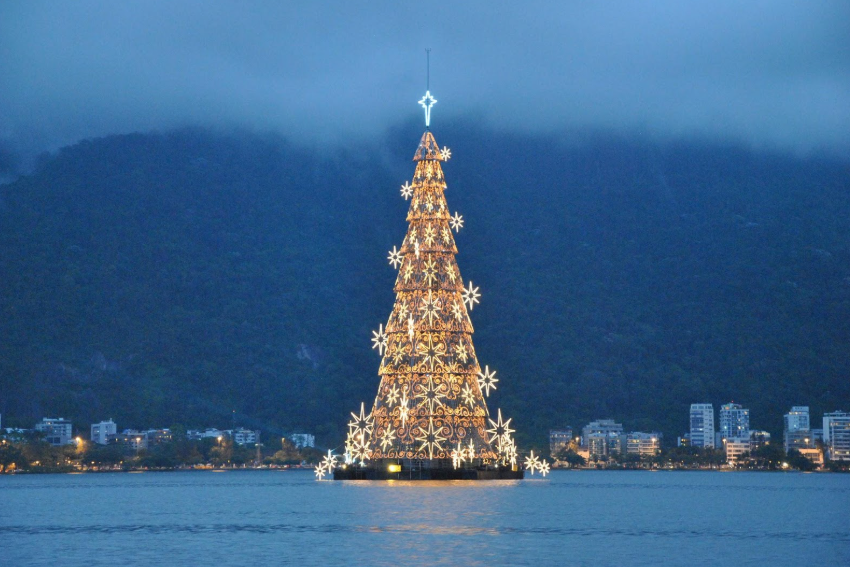The holiday season just wrapped up, and whether you shopped, hung lights and decorated the front yard, or prepared a scrumptious feast, you can say that the holidays all have their own traditions.
That got us thinking: there are a great number of important holidays and traditions celebrated around the world, so why don’t we ask our Intensive English students to share their experiences? Read on to find out about Christmas in the summer, the Lantern Festival, Day of the Dead, and more!
Didi: Christmas - Brazil 🇧🇷

Christmas is truly a global holiday. Like here in the United States, there are many countries around the world that have their own unique Christmas traditions. One such country is Brazil, where a majority of the population is Christian. There are several traditions, however, that tourists might not be immediately familiar with.
During our frigid winters in the Northern Hemisphere, the Southern Hemisphere is baking in the heat of summer! And since Christmas is always on December 25th, if you celebrate south of the Equator, you just might be wishing for a bottle of sunscreen in your Christmas stocking.
Didi has her own family traditions for Christmas in Brazil. “We get together as a family and we prepare a lot of food like turkey…salpicão, and desserts like pavê and ice cream,” Didi said.
If you’re unfamiliar with the dish, salpicão is a variety of chicken salad typical of Brazilian holiday dinner tables. It also usually includes vegetables, mayonnaise, and shoestring potato sticks. Some varieties use fish as a substitute for the chicken as well.
For dessert, pavê is similar to tiramisu in structure: rows of starchy cookies (usually maizena) alternate with clouds of condensed milk and chocolate cream. This luscious dessert is a perfect cap to a filling Christmas meal in Brazil.
Fatih: Republic Day - Türkiye 🇹🇷

Independence Day is one of the most important holidays in the United States, and certainly to every other country that also celebrates their independence. In Türkiye, for example, Republic day takes place each year on October 29th. “The day [commemorates when] the republic was founded,” Fatih said. That date, to be exact, was October 29th, 1923.
The date is an important one for Fatih. “It reminds us that the Republic exists,” Fatih said. “That day is a public holiday.” People typically celebrate with red and white decorations, the colors on Türkiye’s flag. Parades typically happen in the morning, while grand fireworks displays, like the one above, light up the night sky.
If you ever happen to be in a major Turkish city in late October, this is a holiday you won’t miss! In fact, celebrations begin in the afternoon the day before and run for a total of 35 hours before concluding on the night of October 29th.
Rio: Obon - Japan 🇯🇵

A traditional holiday to honor familial ancestors, Obon usually occurs in mid-August each year in most regions of Japan. The festival evolved from a custom in Buddhism and now involves families visiting the ancestral sites of their forebears. “[Around] August 12-15, my family [ancestors] come,” Rio said.
Two previously-established festivals - one from Taoism and one from Buddhism - influenced the growth of Obon. A traditional dance, called Bon Odori, is also performed during the holiday. The most important part for Rio, however, is family.
“We remember [our ancestors] and talk about them,” Rio said. “We [put] some [of] the dead people's favorite things [in] my family's shrines [and]...we clean my family grave.”
Obon is also closely associated with lanterns. During the holiday, people will float lanterns down rivers in their hometowns in remembrance of their ancestors. Lanterns also light up the night sky around festival sites and cities, making for a colorful and relaxing experience.
Armando: Día de Los Muertos - Mexico 🇲🇽

In Mexico, Day of the Dead is celebrated every year in early November and usually lasts a few days. As the name indicates, this festival’s purpose is to “honor the idea that death is a normal part of life,” Armando said. Traditionally, families can make an ofrenda table, which contains some of the favorite food and beverages of the deceased, photos to remember them by, and other personal items.
Typical dishes you might encounter at Day of the Dead celebrations include tamales, pan de muerto (a type of sweet bread topped with sugar and skull decorations), and iced hibiscus herbal tea (known as agua de jamaica).
“[We] celebrate the lives of departed family members with food, beverages, and family get-togethers,” Armando said.
Calaveras, small skulls made of sugar or clay, and marigold flowers are also commonly used in honoring the deceased in Day of the Dead processions. Armando said he enjoys “The tradition, the good vibes, and the delectable food.”
Rebeca: Barranquilla Carnival - Colombia 🇨🇴

Colombia has many festivals - both local and country-wide - but Rebeca’s favorite is the Barranquilla Carnival, which happens every year about four days before Lent. City residents decorate their houses and begin preparing for the parade, taking part in one of the largest carnivals in the world.
“My favorite [holiday] is Carnival in Barranquilla because it’s a big party,” Rebeca said. “The people are very happy, and [there are] different singers, parades, and dances in the [whole] city.”
Traditional Colombian music, known as cumbia, is prominent throughout the festival, which starts with an event called the Battle of the Flowers on the first day. In the dances, there are Afro-Caribbean, Spanish, and African influences adding on to local ones. After a few days of parades and partying, the festival concludes just before the Lenten season begins.
We hope you enjoyed reading about some of the world’s holidays, festivals, and traditions with us. Wherever you are in the world, we wish you a festive and happy holiday season. We will return in the new year with brand new blog posts and more excitement, so stay tuned until then!
by Hadrian Barbosa

